BULAW5916 Taxation Law & Practice: Implications of Harding Judgements
VerifiedAdded on 2022/09/16
|11
|2886
|16
Essay
AI Summary
This essay provides a comprehensive analysis of the tax implications for Australians living as expatriates, focusing on the landmark cases of "Harding v Commissioner of Taxation (2018)" and "Harding v Federal Commissioner of Taxation (2019)." It examines the complexities of Australian taxation law, particularly regarding residency status and the application of the ordinary concepts test and the permanent place of abode test. The essay delves into the specifics of the Harding cases, exploring how the Federal Court's decisions have shaped the understanding of tax residency for individuals working overseas. The analysis considers the factors influencing residency determination, such as the nature of accommodation, the intention to return, and the maintenance of ties with Australia. The essay highlights the importance of these judgements for expatriates, shedding light on the criteria used to establish and maintain non-resident status for tax purposes. The conclusion emphasizes the significance of these cases in clarifying the interpretation of tax laws related to expatriates and their tax obligations.
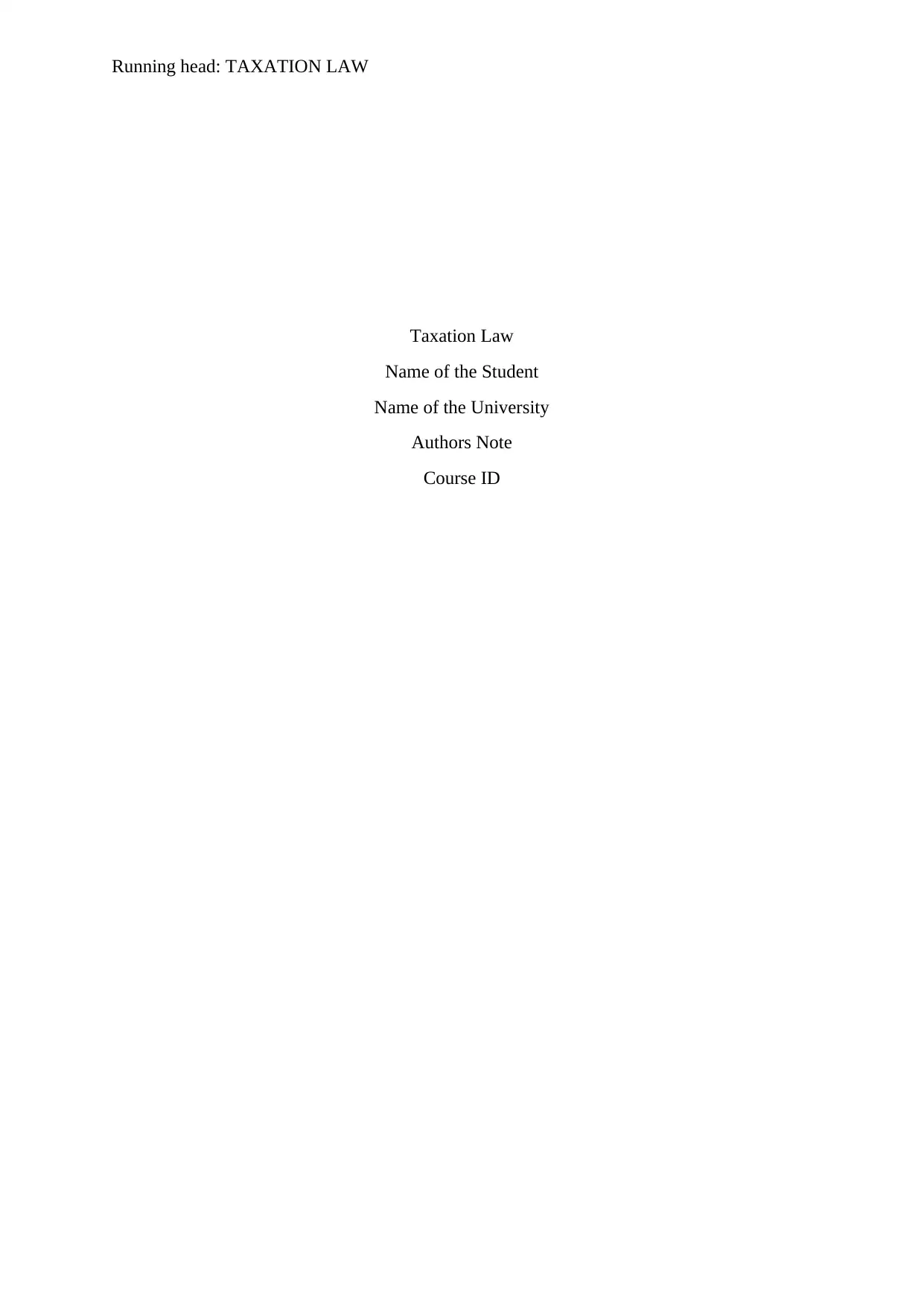
Running head: TAXATION LAW
Taxation Law
Name of the Student
Name of the University
Authors Note
Course ID
Taxation Law
Name of the Student
Name of the University
Authors Note
Course ID
Paraphrase This Document
Need a fresh take? Get an instant paraphrase of this document with our AI Paraphraser
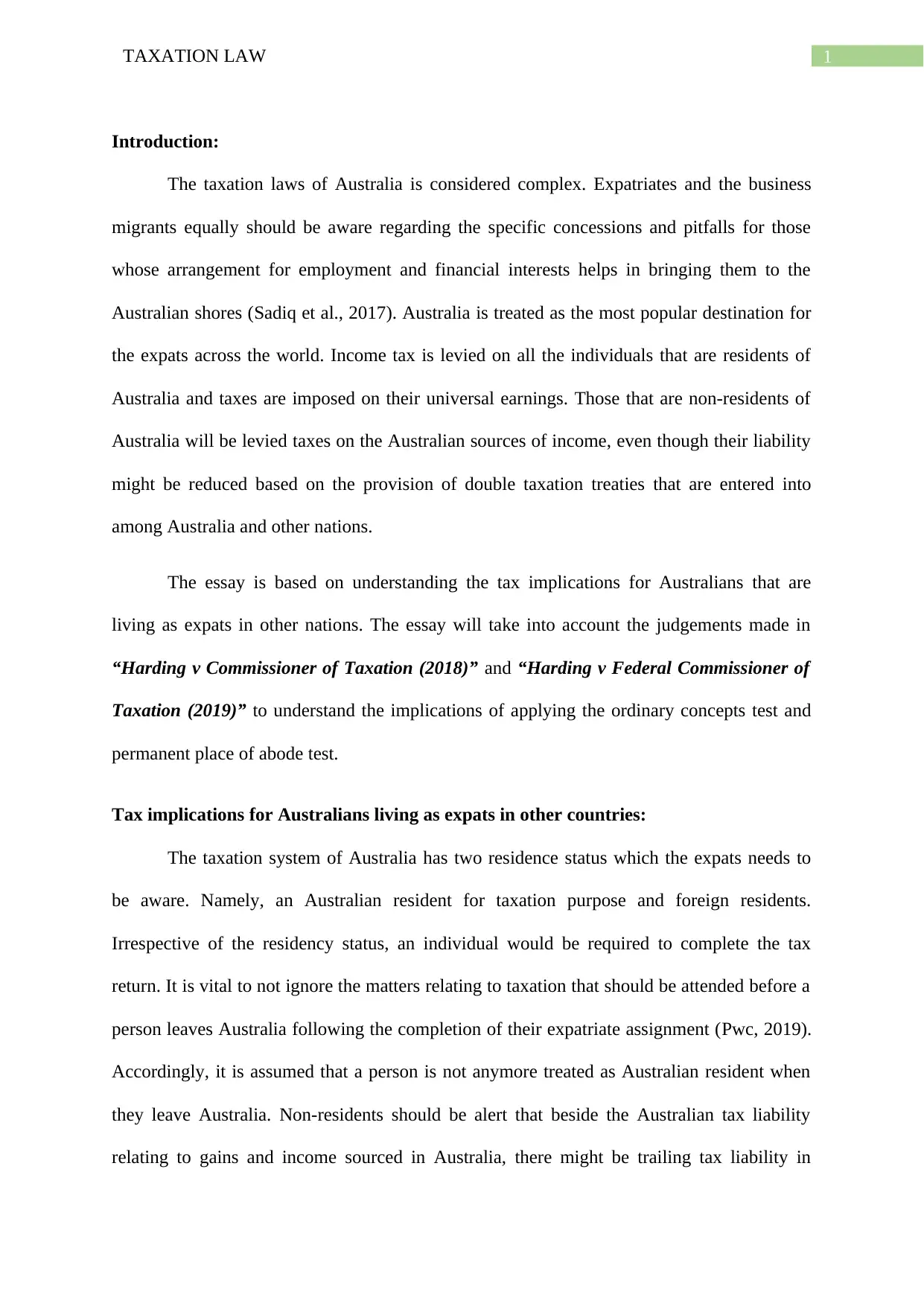
1TAXATION LAW
Introduction:
The taxation laws of Australia is considered complex. Expatriates and the business
migrants equally should be aware regarding the specific concessions and pitfalls for those
whose arrangement for employment and financial interests helps in bringing them to the
Australian shores (Sadiq et al., 2017). Australia is treated as the most popular destination for
the expats across the world. Income tax is levied on all the individuals that are residents of
Australia and taxes are imposed on their universal earnings. Those that are non-residents of
Australia will be levied taxes on the Australian sources of income, even though their liability
might be reduced based on the provision of double taxation treaties that are entered into
among Australia and other nations.
The essay is based on understanding the tax implications for Australians that are
living as expats in other nations. The essay will take into account the judgements made in
“Harding v Commissioner of Taxation (2018)” and “Harding v Federal Commissioner of
Taxation (2019)” to understand the implications of applying the ordinary concepts test and
permanent place of abode test.
Tax implications for Australians living as expats in other countries:
The taxation system of Australia has two residence status which the expats needs to
be aware. Namely, an Australian resident for taxation purpose and foreign residents.
Irrespective of the residency status, an individual would be required to complete the tax
return. It is vital to not ignore the matters relating to taxation that should be attended before a
person leaves Australia following the completion of their expatriate assignment (Pwc, 2019).
Accordingly, it is assumed that a person is not anymore treated as Australian resident when
they leave Australia. Non-residents should be alert that beside the Australian tax liability
relating to gains and income sourced in Australia, there might be trailing tax liability in
Introduction:
The taxation laws of Australia is considered complex. Expatriates and the business
migrants equally should be aware regarding the specific concessions and pitfalls for those
whose arrangement for employment and financial interests helps in bringing them to the
Australian shores (Sadiq et al., 2017). Australia is treated as the most popular destination for
the expats across the world. Income tax is levied on all the individuals that are residents of
Australia and taxes are imposed on their universal earnings. Those that are non-residents of
Australia will be levied taxes on the Australian sources of income, even though their liability
might be reduced based on the provision of double taxation treaties that are entered into
among Australia and other nations.
The essay is based on understanding the tax implications for Australians that are
living as expats in other nations. The essay will take into account the judgements made in
“Harding v Commissioner of Taxation (2018)” and “Harding v Federal Commissioner of
Taxation (2019)” to understand the implications of applying the ordinary concepts test and
permanent place of abode test.
Tax implications for Australians living as expats in other countries:
The taxation system of Australia has two residence status which the expats needs to
be aware. Namely, an Australian resident for taxation purpose and foreign residents.
Irrespective of the residency status, an individual would be required to complete the tax
return. It is vital to not ignore the matters relating to taxation that should be attended before a
person leaves Australia following the completion of their expatriate assignment (Pwc, 2019).
Accordingly, it is assumed that a person is not anymore treated as Australian resident when
they leave Australia. Non-residents should be alert that beside the Australian tax liability
relating to gains and income sourced in Australia, there might be trailing tax liability in

2TAXATION LAW
relation to employee share benefit plan or deferred bonus plan which is partially in relation to
the period of Australian employment.
Preparation should be made relating to lodgement of tax returns for the year in which
a person leaves Australia. Information such as the date on which the individual ceased to be
resident, details regarding employment and investment received till departure and details or
Australian sourced income earned after departure is important.
In the leading case of “Harding v Commissioner of Taxation (2018)” a decision was
made that would benefit several Australians that decided to relocate overseas for the extended
timespan (Pwc, 2019). The Australian Federal Court ruled that the Australians that are
working overseas can cease to be Australian resident for tax purpose when they take up
temporary accommodation in their fixed overseas location. The questions relating to
residency position for tax purpose was addressed by Federal Court in the case of “Harding v
Commissioner of Taxation (2018)” which highlighted the range of issues which is relevant
for the Australian expatriates that are working overseas for the extended time period
(Judgments fedcourt, 2019). The taxpayer along with his family lived in Australia for eight
years after earlier working in foreign country for around 10 years. An offer of permanent job
was accepted by the taxpayer and moved to foreign country indefinitely having no intention
of coming back to live in Australia.
Mr Harding’s wife and his wife were planning to join him in foreign when their
second child had finished up his high school in about two years’ time. Even though Mr
Harding held an Australian home together with his wife, he took all his personal belongings
with him and sold his water skis and boat (Deloitte, 2019). Throughout the period in question,
he lived in the different completely furnished apartments, originally with the motive that he
would move in the different accommodation when his family would join him. Nevertheless,
relation to employee share benefit plan or deferred bonus plan which is partially in relation to
the period of Australian employment.
Preparation should be made relating to lodgement of tax returns for the year in which
a person leaves Australia. Information such as the date on which the individual ceased to be
resident, details regarding employment and investment received till departure and details or
Australian sourced income earned after departure is important.
In the leading case of “Harding v Commissioner of Taxation (2018)” a decision was
made that would benefit several Australians that decided to relocate overseas for the extended
timespan (Pwc, 2019). The Australian Federal Court ruled that the Australians that are
working overseas can cease to be Australian resident for tax purpose when they take up
temporary accommodation in their fixed overseas location. The questions relating to
residency position for tax purpose was addressed by Federal Court in the case of “Harding v
Commissioner of Taxation (2018)” which highlighted the range of issues which is relevant
for the Australian expatriates that are working overseas for the extended time period
(Judgments fedcourt, 2019). The taxpayer along with his family lived in Australia for eight
years after earlier working in foreign country for around 10 years. An offer of permanent job
was accepted by the taxpayer and moved to foreign country indefinitely having no intention
of coming back to live in Australia.
Mr Harding’s wife and his wife were planning to join him in foreign when their
second child had finished up his high school in about two years’ time. Even though Mr
Harding held an Australian home together with his wife, he took all his personal belongings
with him and sold his water skis and boat (Deloitte, 2019). Throughout the period in question,
he lived in the different completely furnished apartments, originally with the motive that he
would move in the different accommodation when his family would join him. Nevertheless,
⊘ This is a preview!⊘
Do you want full access?
Subscribe today to unlock all pages.

Trusted by 1+ million students worldwide
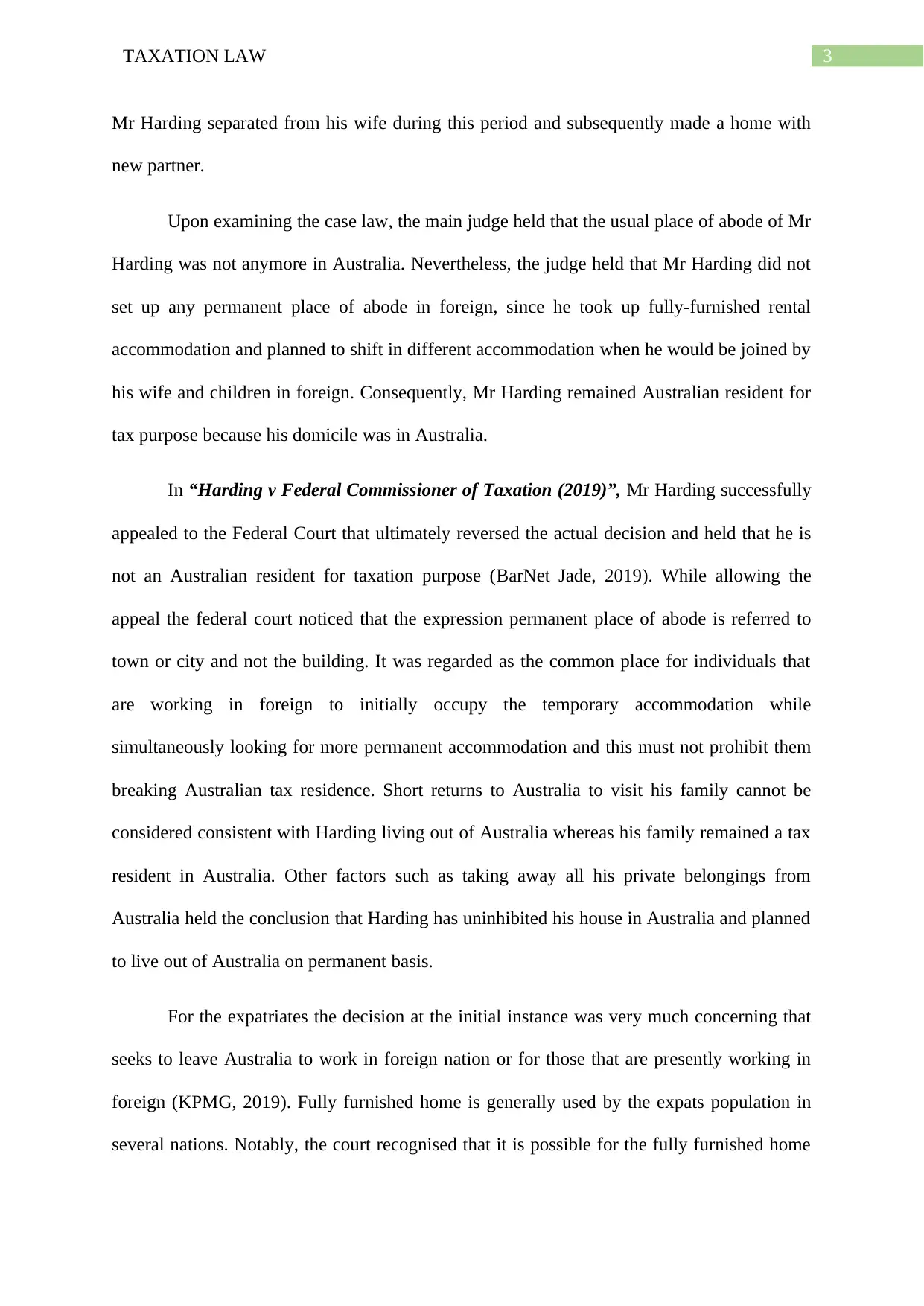
3TAXATION LAW
Mr Harding separated from his wife during this period and subsequently made a home with
new partner.
Upon examining the case law, the main judge held that the usual place of abode of Mr
Harding was not anymore in Australia. Nevertheless, the judge held that Mr Harding did not
set up any permanent place of abode in foreign, since he took up fully-furnished rental
accommodation and planned to shift in different accommodation when he would be joined by
his wife and children in foreign. Consequently, Mr Harding remained Australian resident for
tax purpose because his domicile was in Australia.
In “Harding v Federal Commissioner of Taxation (2019)”, Mr Harding successfully
appealed to the Federal Court that ultimately reversed the actual decision and held that he is
not an Australian resident for taxation purpose (BarNet Jade, 2019). While allowing the
appeal the federal court noticed that the expression permanent place of abode is referred to
town or city and not the building. It was regarded as the common place for individuals that
are working in foreign to initially occupy the temporary accommodation while
simultaneously looking for more permanent accommodation and this must not prohibit them
breaking Australian tax residence. Short returns to Australia to visit his family cannot be
considered consistent with Harding living out of Australia whereas his family remained a tax
resident in Australia. Other factors such as taking away all his private belongings from
Australia held the conclusion that Harding has uninhibited his house in Australia and planned
to live out of Australia on permanent basis.
For the expatriates the decision at the initial instance was very much concerning that
seeks to leave Australia to work in foreign nation or for those that are presently working in
foreign (KPMG, 2019). Fully furnished home is generally used by the expats population in
several nations. Notably, the court recognised that it is possible for the fully furnished home
Mr Harding separated from his wife during this period and subsequently made a home with
new partner.
Upon examining the case law, the main judge held that the usual place of abode of Mr
Harding was not anymore in Australia. Nevertheless, the judge held that Mr Harding did not
set up any permanent place of abode in foreign, since he took up fully-furnished rental
accommodation and planned to shift in different accommodation when he would be joined by
his wife and children in foreign. Consequently, Mr Harding remained Australian resident for
tax purpose because his domicile was in Australia.
In “Harding v Federal Commissioner of Taxation (2019)”, Mr Harding successfully
appealed to the Federal Court that ultimately reversed the actual decision and held that he is
not an Australian resident for taxation purpose (BarNet Jade, 2019). While allowing the
appeal the federal court noticed that the expression permanent place of abode is referred to
town or city and not the building. It was regarded as the common place for individuals that
are working in foreign to initially occupy the temporary accommodation while
simultaneously looking for more permanent accommodation and this must not prohibit them
breaking Australian tax residence. Short returns to Australia to visit his family cannot be
considered consistent with Harding living out of Australia whereas his family remained a tax
resident in Australia. Other factors such as taking away all his private belongings from
Australia held the conclusion that Harding has uninhibited his house in Australia and planned
to live out of Australia on permanent basis.
For the expatriates the decision at the initial instance was very much concerning that
seeks to leave Australia to work in foreign nation or for those that are presently working in
foreign (KPMG, 2019). Fully furnished home is generally used by the expats population in
several nations. Notably, the court recognised that it is possible for the fully furnished home
Paraphrase This Document
Need a fresh take? Get an instant paraphrase of this document with our AI Paraphraser
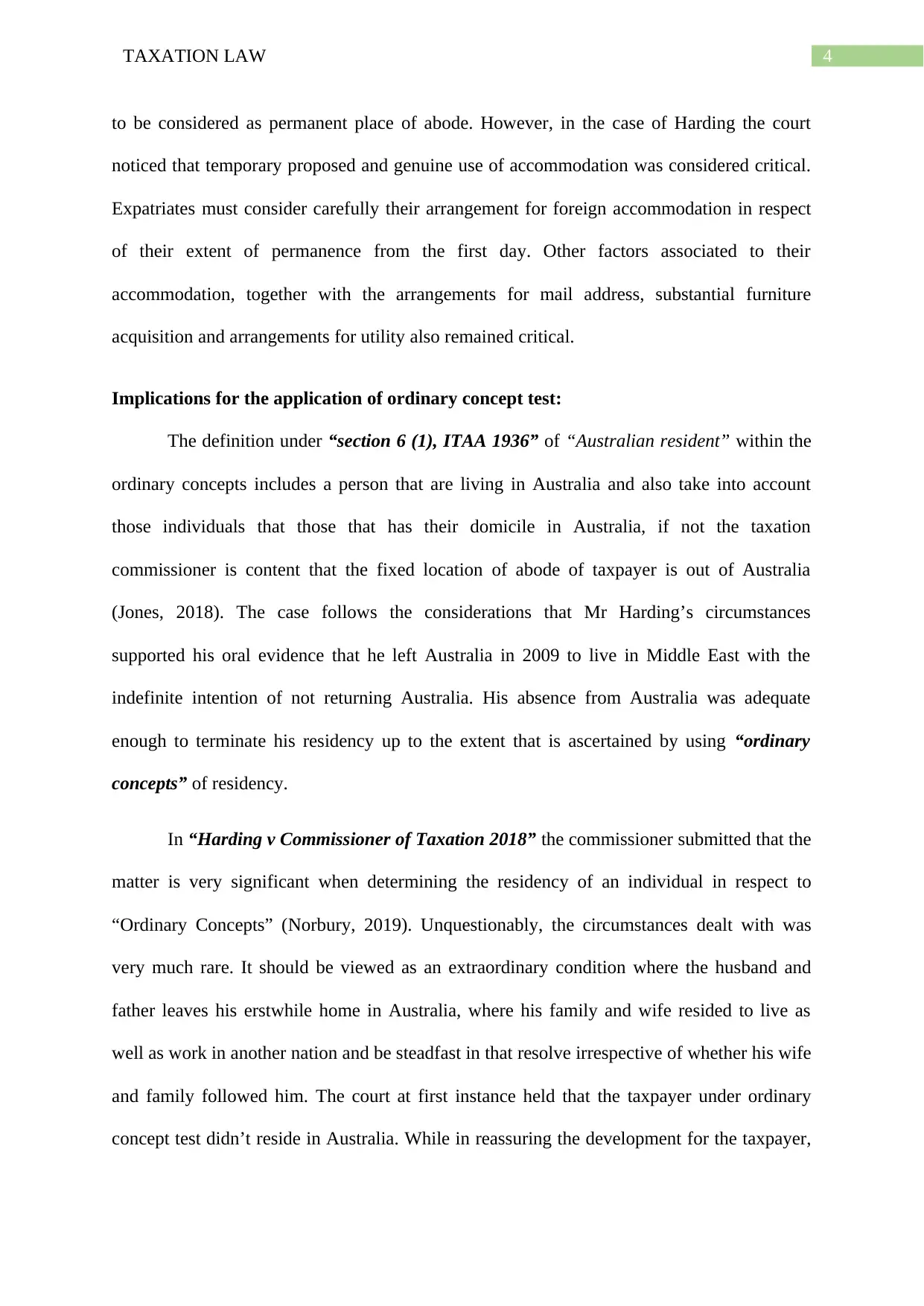
4TAXATION LAW
to be considered as permanent place of abode. However, in the case of Harding the court
noticed that temporary proposed and genuine use of accommodation was considered critical.
Expatriates must consider carefully their arrangement for foreign accommodation in respect
of their extent of permanence from the first day. Other factors associated to their
accommodation, together with the arrangements for mail address, substantial furniture
acquisition and arrangements for utility also remained critical.
Implications for the application of ordinary concept test:
The definition under “section 6 (1), ITAA 1936” of “Australian resident” within the
ordinary concepts includes a person that are living in Australia and also take into account
those individuals that those that has their domicile in Australia, if not the taxation
commissioner is content that the fixed location of abode of taxpayer is out of Australia
(Jones, 2018). The case follows the considerations that Mr Harding’s circumstances
supported his oral evidence that he left Australia in 2009 to live in Middle East with the
indefinite intention of not returning Australia. His absence from Australia was adequate
enough to terminate his residency up to the extent that is ascertained by using “ordinary
concepts” of residency.
In “Harding v Commissioner of Taxation 2018” the commissioner submitted that the
matter is very significant when determining the residency of an individual in respect to
“Ordinary Concepts” (Norbury, 2019). Unquestionably, the circumstances dealt with was
very much rare. It should be viewed as an extraordinary condition where the husband and
father leaves his erstwhile home in Australia, where his family and wife resided to live as
well as work in another nation and be steadfast in that resolve irrespective of whether his wife
and family followed him. The court at first instance held that the taxpayer under ordinary
concept test didn’t reside in Australia. While in reassuring the development for the taxpayer,
to be considered as permanent place of abode. However, in the case of Harding the court
noticed that temporary proposed and genuine use of accommodation was considered critical.
Expatriates must consider carefully their arrangement for foreign accommodation in respect
of their extent of permanence from the first day. Other factors associated to their
accommodation, together with the arrangements for mail address, substantial furniture
acquisition and arrangements for utility also remained critical.
Implications for the application of ordinary concept test:
The definition under “section 6 (1), ITAA 1936” of “Australian resident” within the
ordinary concepts includes a person that are living in Australia and also take into account
those individuals that those that has their domicile in Australia, if not the taxation
commissioner is content that the fixed location of abode of taxpayer is out of Australia
(Jones, 2018). The case follows the considerations that Mr Harding’s circumstances
supported his oral evidence that he left Australia in 2009 to live in Middle East with the
indefinite intention of not returning Australia. His absence from Australia was adequate
enough to terminate his residency up to the extent that is ascertained by using “ordinary
concepts” of residency.
In “Harding v Commissioner of Taxation 2018” the commissioner submitted that the
matter is very significant when determining the residency of an individual in respect to
“Ordinary Concepts” (Norbury, 2019). Unquestionably, the circumstances dealt with was
very much rare. It should be viewed as an extraordinary condition where the husband and
father leaves his erstwhile home in Australia, where his family and wife resided to live as
well as work in another nation and be steadfast in that resolve irrespective of whether his wife
and family followed him. The court at first instance held that the taxpayer under ordinary
concept test didn’t reside in Australia. While in reassuring the development for the taxpayer,
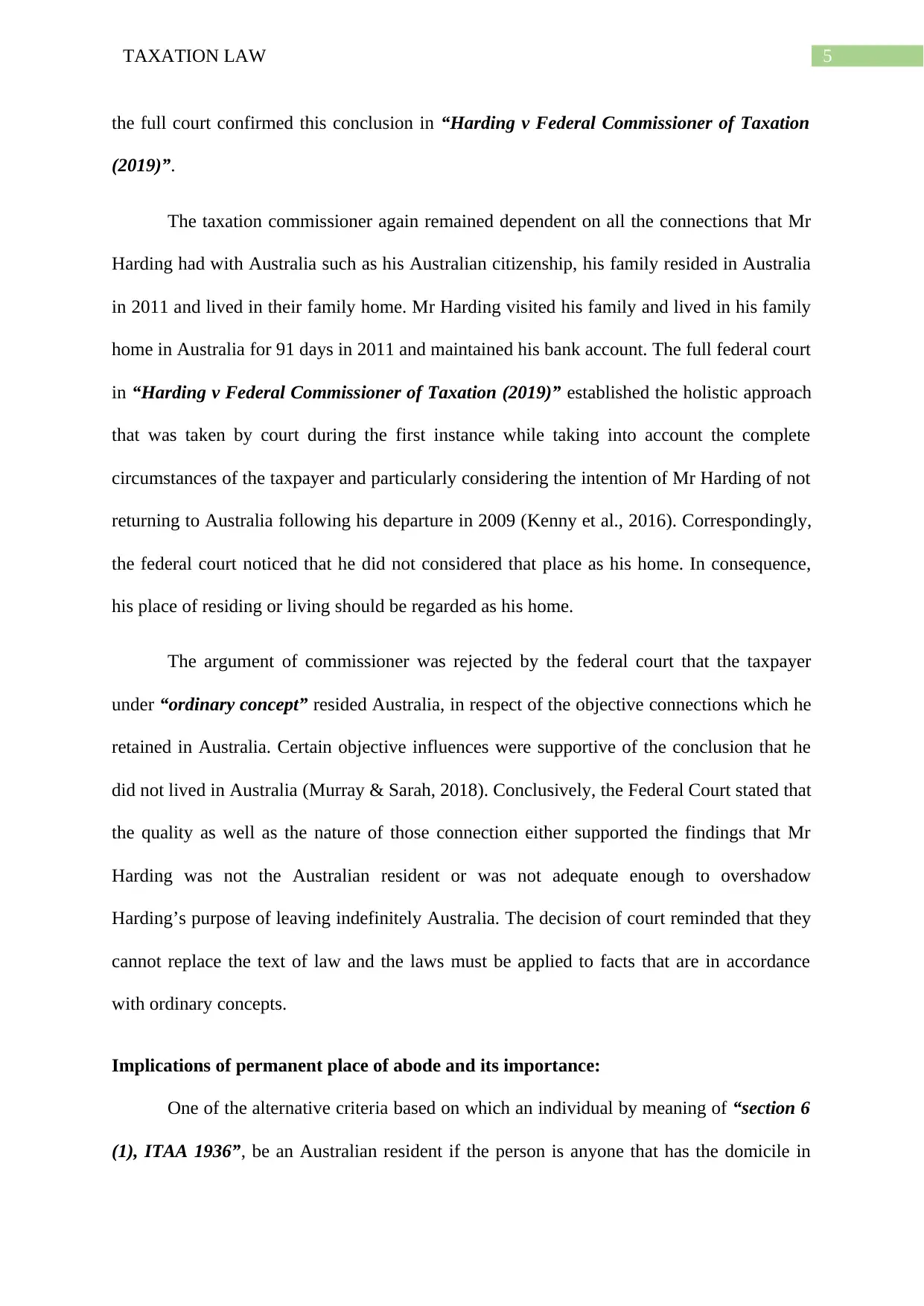
5TAXATION LAW
the full court confirmed this conclusion in “Harding v Federal Commissioner of Taxation
(2019)”.
The taxation commissioner again remained dependent on all the connections that Mr
Harding had with Australia such as his Australian citizenship, his family resided in Australia
in 2011 and lived in their family home. Mr Harding visited his family and lived in his family
home in Australia for 91 days in 2011 and maintained his bank account. The full federal court
in “Harding v Federal Commissioner of Taxation (2019)” established the holistic approach
that was taken by court during the first instance while taking into account the complete
circumstances of the taxpayer and particularly considering the intention of Mr Harding of not
returning to Australia following his departure in 2009 (Kenny et al., 2016). Correspondingly,
the federal court noticed that he did not considered that place as his home. In consequence,
his place of residing or living should be regarded as his home.
The argument of commissioner was rejected by the federal court that the taxpayer
under “ordinary concept” resided Australia, in respect of the objective connections which he
retained in Australia. Certain objective influences were supportive of the conclusion that he
did not lived in Australia (Murray & Sarah, 2018). Conclusively, the Federal Court stated that
the quality as well as the nature of those connection either supported the findings that Mr
Harding was not the Australian resident or was not adequate enough to overshadow
Harding’s purpose of leaving indefinitely Australia. The decision of court reminded that they
cannot replace the text of law and the laws must be applied to facts that are in accordance
with ordinary concepts.
Implications of permanent place of abode and its importance:
One of the alternative criteria based on which an individual by meaning of “section 6
(1), ITAA 1936”, be an Australian resident if the person is anyone that has the domicile in
the full court confirmed this conclusion in “Harding v Federal Commissioner of Taxation
(2019)”.
The taxation commissioner again remained dependent on all the connections that Mr
Harding had with Australia such as his Australian citizenship, his family resided in Australia
in 2011 and lived in their family home. Mr Harding visited his family and lived in his family
home in Australia for 91 days in 2011 and maintained his bank account. The full federal court
in “Harding v Federal Commissioner of Taxation (2019)” established the holistic approach
that was taken by court during the first instance while taking into account the complete
circumstances of the taxpayer and particularly considering the intention of Mr Harding of not
returning to Australia following his departure in 2009 (Kenny et al., 2016). Correspondingly,
the federal court noticed that he did not considered that place as his home. In consequence,
his place of residing or living should be regarded as his home.
The argument of commissioner was rejected by the federal court that the taxpayer
under “ordinary concept” resided Australia, in respect of the objective connections which he
retained in Australia. Certain objective influences were supportive of the conclusion that he
did not lived in Australia (Murray & Sarah, 2018). Conclusively, the Federal Court stated that
the quality as well as the nature of those connection either supported the findings that Mr
Harding was not the Australian resident or was not adequate enough to overshadow
Harding’s purpose of leaving indefinitely Australia. The decision of court reminded that they
cannot replace the text of law and the laws must be applied to facts that are in accordance
with ordinary concepts.
Implications of permanent place of abode and its importance:
One of the alternative criteria based on which an individual by meaning of “section 6
(1), ITAA 1936”, be an Australian resident if the person is anyone that has the domicile in
⊘ This is a preview!⊘
Do you want full access?
Subscribe today to unlock all pages.

Trusted by 1+ million students worldwide
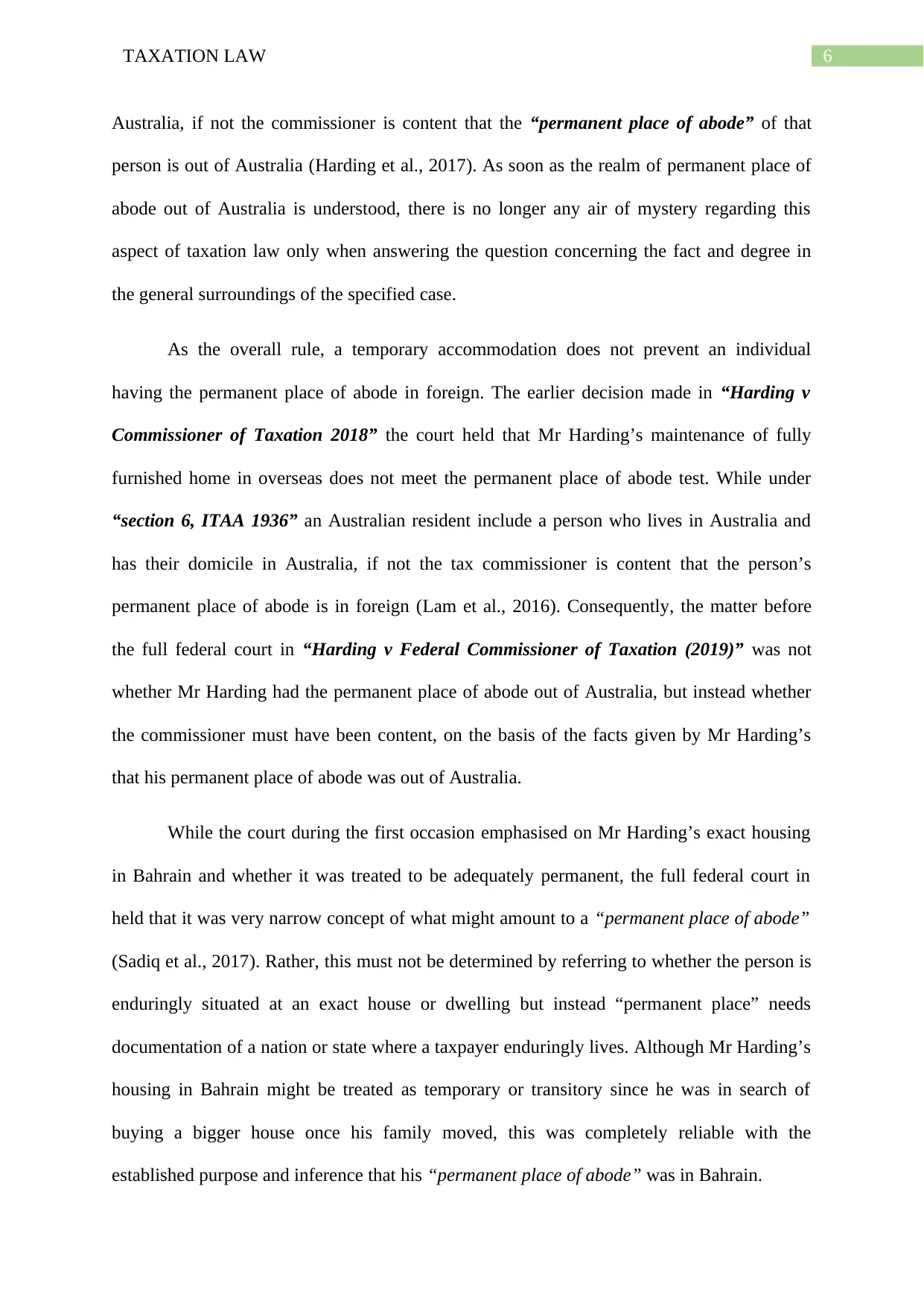
6TAXATION LAW
Australia, if not the commissioner is content that the “permanent place of abode” of that
person is out of Australia (Harding et al., 2017). As soon as the realm of permanent place of
abode out of Australia is understood, there is no longer any air of mystery regarding this
aspect of taxation law only when answering the question concerning the fact and degree in
the general surroundings of the specified case.
As the overall rule, a temporary accommodation does not prevent an individual
having the permanent place of abode in foreign. The earlier decision made in “Harding v
Commissioner of Taxation 2018” the court held that Mr Harding’s maintenance of fully
furnished home in overseas does not meet the permanent place of abode test. While under
“section 6, ITAA 1936” an Australian resident include a person who lives in Australia and
has their domicile in Australia, if not the tax commissioner is content that the person’s
permanent place of abode is in foreign (Lam et al., 2016). Consequently, the matter before
the full federal court in “Harding v Federal Commissioner of Taxation (2019)” was not
whether Mr Harding had the permanent place of abode out of Australia, but instead whether
the commissioner must have been content, on the basis of the facts given by Mr Harding’s
that his permanent place of abode was out of Australia.
While the court during the first occasion emphasised on Mr Harding’s exact housing
in Bahrain and whether it was treated to be adequately permanent, the full federal court in
held that it was very narrow concept of what might amount to a “permanent place of abode”
(Sadiq et al., 2017). Rather, this must not be determined by referring to whether the person is
enduringly situated at an exact house or dwelling but instead “permanent place” needs
documentation of a nation or state where a taxpayer enduringly lives. Although Mr Harding’s
housing in Bahrain might be treated as temporary or transitory since he was in search of
buying a bigger house once his family moved, this was completely reliable with the
established purpose and inference that his “permanent place of abode” was in Bahrain.
Australia, if not the commissioner is content that the “permanent place of abode” of that
person is out of Australia (Harding et al., 2017). As soon as the realm of permanent place of
abode out of Australia is understood, there is no longer any air of mystery regarding this
aspect of taxation law only when answering the question concerning the fact and degree in
the general surroundings of the specified case.
As the overall rule, a temporary accommodation does not prevent an individual
having the permanent place of abode in foreign. The earlier decision made in “Harding v
Commissioner of Taxation 2018” the court held that Mr Harding’s maintenance of fully
furnished home in overseas does not meet the permanent place of abode test. While under
“section 6, ITAA 1936” an Australian resident include a person who lives in Australia and
has their domicile in Australia, if not the tax commissioner is content that the person’s
permanent place of abode is in foreign (Lam et al., 2016). Consequently, the matter before
the full federal court in “Harding v Federal Commissioner of Taxation (2019)” was not
whether Mr Harding had the permanent place of abode out of Australia, but instead whether
the commissioner must have been content, on the basis of the facts given by Mr Harding’s
that his permanent place of abode was out of Australia.
While the court during the first occasion emphasised on Mr Harding’s exact housing
in Bahrain and whether it was treated to be adequately permanent, the full federal court in
held that it was very narrow concept of what might amount to a “permanent place of abode”
(Sadiq et al., 2017). Rather, this must not be determined by referring to whether the person is
enduringly situated at an exact house or dwelling but instead “permanent place” needs
documentation of a nation or state where a taxpayer enduringly lives. Although Mr Harding’s
housing in Bahrain might be treated as temporary or transitory since he was in search of
buying a bigger house once his family moved, this was completely reliable with the
established purpose and inference that his “permanent place of abode” was in Bahrain.
Paraphrase This Document
Need a fresh take? Get an instant paraphrase of this document with our AI Paraphraser
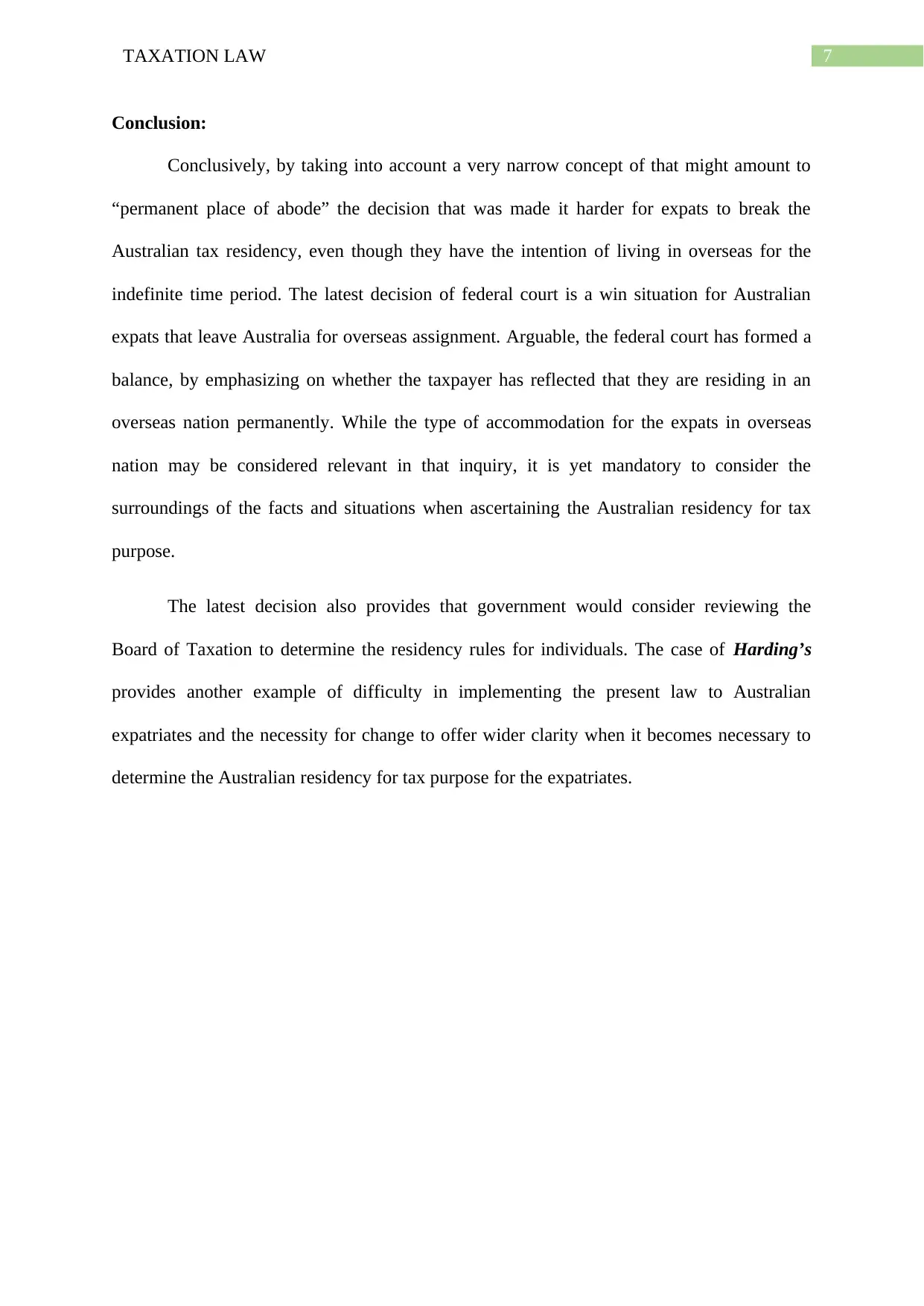
7TAXATION LAW
Conclusion:
Conclusively, by taking into account a very narrow concept of that might amount to
“permanent place of abode” the decision that was made it harder for expats to break the
Australian tax residency, even though they have the intention of living in overseas for the
indefinite time period. The latest decision of federal court is a win situation for Australian
expats that leave Australia for overseas assignment. Arguable, the federal court has formed a
balance, by emphasizing on whether the taxpayer has reflected that they are residing in an
overseas nation permanently. While the type of accommodation for the expats in overseas
nation may be considered relevant in that inquiry, it is yet mandatory to consider the
surroundings of the facts and situations when ascertaining the Australian residency for tax
purpose.
The latest decision also provides that government would consider reviewing the
Board of Taxation to determine the residency rules for individuals. The case of Harding’s
provides another example of difficulty in implementing the present law to Australian
expatriates and the necessity for change to offer wider clarity when it becomes necessary to
determine the Australian residency for tax purpose for the expatriates.
Conclusion:
Conclusively, by taking into account a very narrow concept of that might amount to
“permanent place of abode” the decision that was made it harder for expats to break the
Australian tax residency, even though they have the intention of living in overseas for the
indefinite time period. The latest decision of federal court is a win situation for Australian
expats that leave Australia for overseas assignment. Arguable, the federal court has formed a
balance, by emphasizing on whether the taxpayer has reflected that they are residing in an
overseas nation permanently. While the type of accommodation for the expats in overseas
nation may be considered relevant in that inquiry, it is yet mandatory to consider the
surroundings of the facts and situations when ascertaining the Australian residency for tax
purpose.
The latest decision also provides that government would consider reviewing the
Board of Taxation to determine the residency rules for individuals. The case of Harding’s
provides another example of difficulty in implementing the present law to Australian
expatriates and the necessity for change to offer wider clarity when it becomes necessary to
determine the Australian residency for tax purpose for the expatriates.
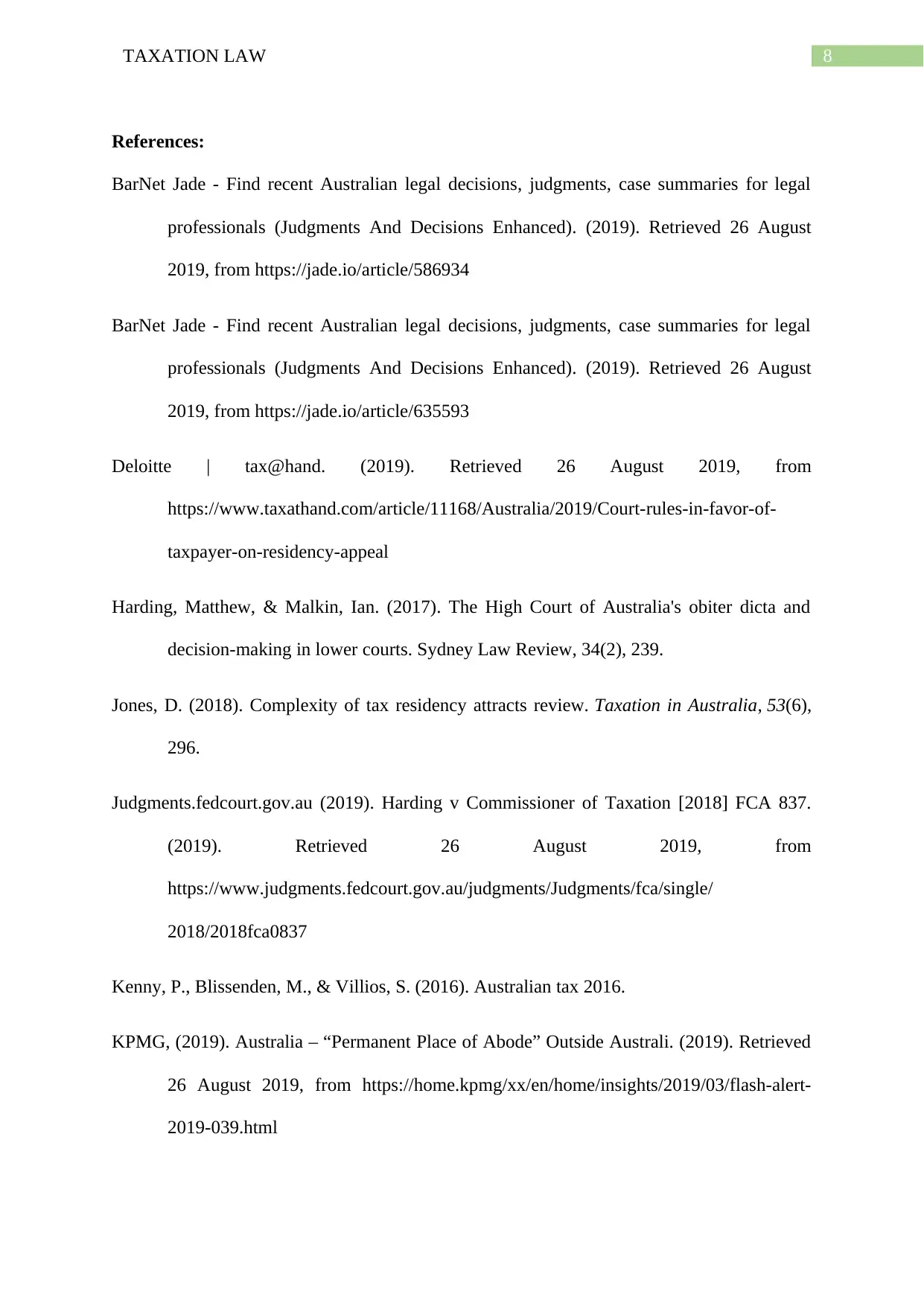
8TAXATION LAW
References:
BarNet Jade - Find recent Australian legal decisions, judgments, case summaries for legal
professionals (Judgments And Decisions Enhanced). (2019). Retrieved 26 August
2019, from https://jade.io/article/586934
BarNet Jade - Find recent Australian legal decisions, judgments, case summaries for legal
professionals (Judgments And Decisions Enhanced). (2019). Retrieved 26 August
2019, from https://jade.io/article/635593
Deloitte | tax@hand. (2019). Retrieved 26 August 2019, from
https://www.taxathand.com/article/11168/Australia/2019/Court-rules-in-favor-of-
taxpayer-on-residency-appeal
Harding, Matthew, & Malkin, Ian. (2017). The High Court of Australia's obiter dicta and
decision-making in lower courts. Sydney Law Review, 34(2), 239.
Jones, D. (2018). Complexity of tax residency attracts review. Taxation in Australia, 53(6),
296.
Judgments.fedcourt.gov.au (2019). Harding v Commissioner of Taxation [2018] FCA 837.
(2019). Retrieved 26 August 2019, from
https://www.judgments.fedcourt.gov.au/judgments/Judgments/fca/single/
2018/2018fca0837
Kenny, P., Blissenden, M., & Villios, S. (2016). Australian tax 2016.
KPMG, (2019). Australia – “Permanent Place of Abode” Outside Australi. (2019). Retrieved
26 August 2019, from https://home.kpmg/xx/en/home/insights/2019/03/flash-alert-
2019-039.html
References:
BarNet Jade - Find recent Australian legal decisions, judgments, case summaries for legal
professionals (Judgments And Decisions Enhanced). (2019). Retrieved 26 August
2019, from https://jade.io/article/586934
BarNet Jade - Find recent Australian legal decisions, judgments, case summaries for legal
professionals (Judgments And Decisions Enhanced). (2019). Retrieved 26 August
2019, from https://jade.io/article/635593
Deloitte | tax@hand. (2019). Retrieved 26 August 2019, from
https://www.taxathand.com/article/11168/Australia/2019/Court-rules-in-favor-of-
taxpayer-on-residency-appeal
Harding, Matthew, & Malkin, Ian. (2017). The High Court of Australia's obiter dicta and
decision-making in lower courts. Sydney Law Review, 34(2), 239.
Jones, D. (2018). Complexity of tax residency attracts review. Taxation in Australia, 53(6),
296.
Judgments.fedcourt.gov.au (2019). Harding v Commissioner of Taxation [2018] FCA 837.
(2019). Retrieved 26 August 2019, from
https://www.judgments.fedcourt.gov.au/judgments/Judgments/fca/single/
2018/2018fca0837
Kenny, P., Blissenden, M., & Villios, S. (2016). Australian tax 2016.
KPMG, (2019). Australia – “Permanent Place of Abode” Outside Australi. (2019). Retrieved
26 August 2019, from https://home.kpmg/xx/en/home/insights/2019/03/flash-alert-
2019-039.html
⊘ This is a preview!⊘
Do you want full access?
Subscribe today to unlock all pages.

Trusted by 1+ million students worldwide
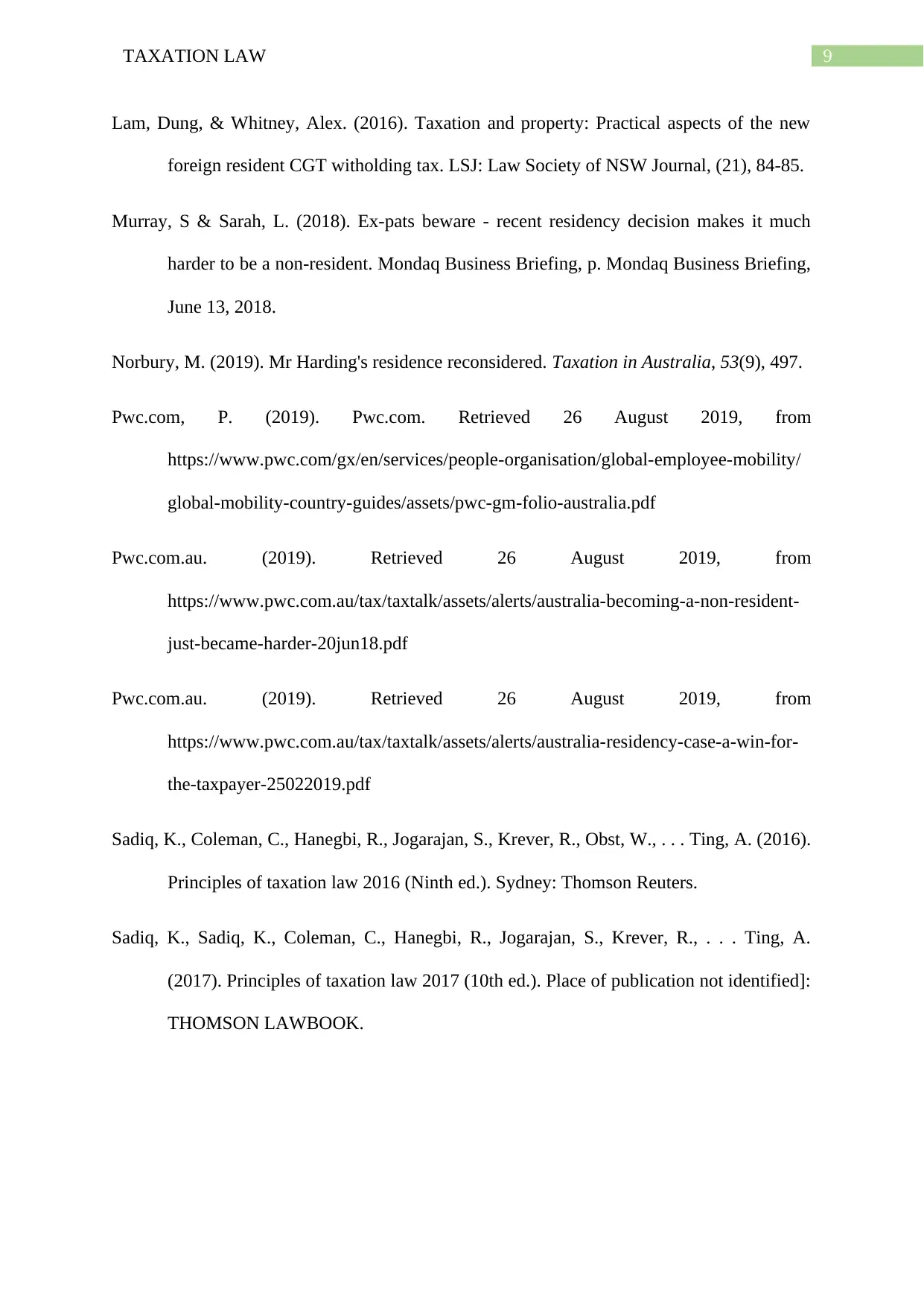
9TAXATION LAW
Lam, Dung, & Whitney, Alex. (2016). Taxation and property: Practical aspects of the new
foreign resident CGT witholding tax. LSJ: Law Society of NSW Journal, (21), 84-85.
Murray, S & Sarah, L. (2018). Ex-pats beware - recent residency decision makes it much
harder to be a non-resident. Mondaq Business Briefing, p. Mondaq Business Briefing,
June 13, 2018.
Norbury, M. (2019). Mr Harding's residence reconsidered. Taxation in Australia, 53(9), 497.
Pwc.com, P. (2019). Pwc.com. Retrieved 26 August 2019, from
https://www.pwc.com/gx/en/services/people-organisation/global-employee-mobility/
global-mobility-country-guides/assets/pwc-gm-folio-australia.pdf
Pwc.com.au. (2019). Retrieved 26 August 2019, from
https://www.pwc.com.au/tax/taxtalk/assets/alerts/australia-becoming-a-non-resident-
just-became-harder-20jun18.pdf
Pwc.com.au. (2019). Retrieved 26 August 2019, from
https://www.pwc.com.au/tax/taxtalk/assets/alerts/australia-residency-case-a-win-for-
the-taxpayer-25022019.pdf
Sadiq, K., Coleman, C., Hanegbi, R., Jogarajan, S., Krever, R., Obst, W., . . . Ting, A. (2016).
Principles of taxation law 2016 (Ninth ed.). Sydney: Thomson Reuters.
Sadiq, K., Sadiq, K., Coleman, C., Hanegbi, R., Jogarajan, S., Krever, R., . . . Ting, A.
(2017). Principles of taxation law 2017 (10th ed.). Place of publication not identified]:
THOMSON LAWBOOK.
Lam, Dung, & Whitney, Alex. (2016). Taxation and property: Practical aspects of the new
foreign resident CGT witholding tax. LSJ: Law Society of NSW Journal, (21), 84-85.
Murray, S & Sarah, L. (2018). Ex-pats beware - recent residency decision makes it much
harder to be a non-resident. Mondaq Business Briefing, p. Mondaq Business Briefing,
June 13, 2018.
Norbury, M. (2019). Mr Harding's residence reconsidered. Taxation in Australia, 53(9), 497.
Pwc.com, P. (2019). Pwc.com. Retrieved 26 August 2019, from
https://www.pwc.com/gx/en/services/people-organisation/global-employee-mobility/
global-mobility-country-guides/assets/pwc-gm-folio-australia.pdf
Pwc.com.au. (2019). Retrieved 26 August 2019, from
https://www.pwc.com.au/tax/taxtalk/assets/alerts/australia-becoming-a-non-resident-
just-became-harder-20jun18.pdf
Pwc.com.au. (2019). Retrieved 26 August 2019, from
https://www.pwc.com.au/tax/taxtalk/assets/alerts/australia-residency-case-a-win-for-
the-taxpayer-25022019.pdf
Sadiq, K., Coleman, C., Hanegbi, R., Jogarajan, S., Krever, R., Obst, W., . . . Ting, A. (2016).
Principles of taxation law 2016 (Ninth ed.). Sydney: Thomson Reuters.
Sadiq, K., Sadiq, K., Coleman, C., Hanegbi, R., Jogarajan, S., Krever, R., . . . Ting, A.
(2017). Principles of taxation law 2017 (10th ed.). Place of publication not identified]:
THOMSON LAWBOOK.
Paraphrase This Document
Need a fresh take? Get an instant paraphrase of this document with our AI Paraphraser

10TAXATION LAW
1 out of 11
Related Documents
Your All-in-One AI-Powered Toolkit for Academic Success.
+13062052269
info@desklib.com
Available 24*7 on WhatsApp / Email
![[object Object]](/_next/static/media/star-bottom.7253800d.svg)
Unlock your academic potential
Copyright © 2020–2026 A2Z Services. All Rights Reserved. Developed and managed by ZUCOL.





